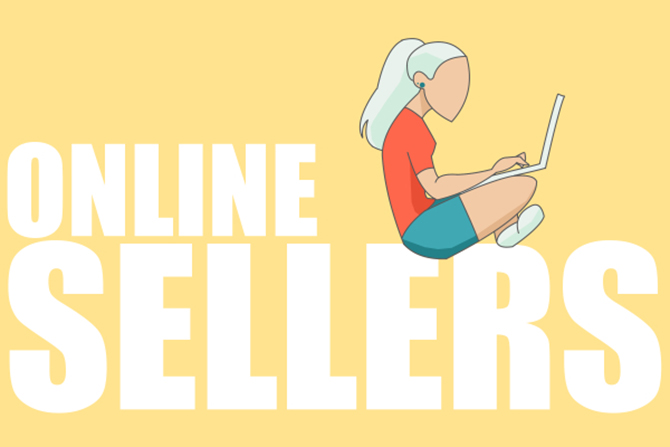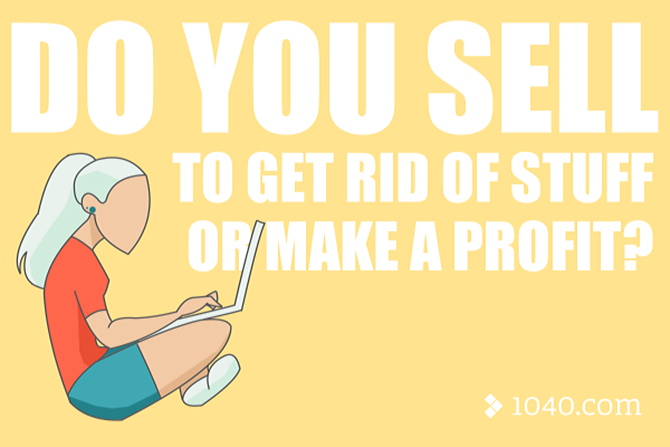Selling Stuff Online? Taxes for Etsy, eBay, LetGo, and More
by Susannah McQuitty

You got this—all you have to do is start!
We make filing taxes delightfully simple with one, flat–rate price. Every feature included for everyone.
Start filing
Update for 2022: Third-party payment companies like PayPal and Venmo are required to report business transactions of more than $600 to the IRS.
The report doesn't apply to personal payments or selling personal items at a loss (which we'll explain more in the first section of this post).
So what does that mean for you? Since you're already required to report business transactions, you probably won't be affected if you're doing things by the books. Read on for more info!
Paying taxes on the money you make from eBay, Etsy, Poshmark, and others seems like a touchy subject, doesn’t it? Part of you may want to just take your chances and figure it out as you go along, but why stress over what you don’t know?
Taxes for online sales isn’t actually that hard—and some people may not even have to pay taxes at all. It comes down to what you’re selling, how much you’re making, and why.
But why not make it even simpler? Let’s look at the three main reasons people sell online and talk straight about what you need to know for taxes.
Selling used and personal items for a couple bucks
Maybe you need to get rid of junk, or maybe you’re doing a true-blue Dave Ramsey cleanse—whatever your motivation, sorting through personal belongings and slating some for your online store can bring in a pretty penny for your efforts.
When you sell personal used belongings for an amount that’s less than you originally paid, you’re in luck: You won’t owe taxes on the money you make. If you use Poshmark to sell a pair of $50 running shoes for $15, you don’t have to pay taxes because the amount you received was less than the original price.
Sure, you won’t be raking in the dough because you’re not selling at a profit, but that amount somewhere between couch money and birthday cash is yours to keep.
Taxes to know:
- As long as you sell your items for less than they cost you, you don’t have to pay taxes on the money you make.
Making back more than you paid (once in a while)
Let’s say you’re getting rid of a painting that cost you $30. An artsy-looking chap strolls by, catches sight of it, and flings his beret into the air for joy. He offers to pay you $200 for the painting, and you take the money. Cha-ching!
You didn’t plan to sell the painting for more than it cost you, so you’re not considered a business. You did, however, have a gain of $170 since you originally paid $30. That $170 is taxable as a capital gain, so when tax time rolls around, you should use Schedule D to report your capital gains and pay taxes accordingly.
Selling for higher than you paid might come up fairly often on eBay, since it’s bidding-based. If you set up an account with the intention of flipping items and selling them for higher than you paid, skip this and go to the next section; if, however, it’s just a happy accident when you get more than you paid, simply report the difference on a Schedule D as capital gains.
Taxes to know:
- Whatever extra income you made will be taxed as a capital gain.
- You can use Schedule D to report capital gains.

Flipping or creating items as a business
Whether you’re making those thrift store finds work in your favor, creating unique pieces to sell on Etsy, or restoring memorabilia to sell on eBay, running a storefront to turn a profit means you’re in the big league now.
Even if it’s just something to do on the side of your day job, congratulations: You are what’s called a “sole proprietor,” which is a fancy way of saying “a person who owns and runs a small business.”
Since your position is a bit fancier, your taxes will be a bit more involved. The key is to keep detailed track of how much you earn (income) and how much it costs to run your business (expenses). Third-party payment sites like PayPal, Square, or Venmo may send you a tax form at the end of the year. These sites are known as Payment Settlement Entities, or PSEs, and the Form 1099-K tax form they may send will include how much money passed through the payment site. That includes personal transactions, too, so make sure to keep good records so you can account for the business-related income.
At the end of the year, you’ll use Schedule C to report your info and subtract expenses from income. You’ll either break even, make a profit (or net earnings) or suffer a loss (which can get you a tax break on your general income).
The platforms you use to sell will typically track your earnings and the cost of goods sold, but if they don’t, make sure you’re ready to fill in the blanks. Check out our blog post on getting started as a small business or freelancer for more info.
Taxes to know:
- Schedule C is going to be your best friend when you file your taxes—consider it a one-stop shop for everything related to your business.
- After listing your income and expenses on Schedule C, calculate any profit by subtracting your business expenses from your income. If you come up with a negative number, you have a loss.
- If your profit exceeds $400, self-employment taxes will be applied.
- If you have a loss, you can deduct that amount from your taxable income without having to itemize deductions.
Let's talk about that $600 reporting requirement for third-party payment services
Due to the American Rescue Plan (ARP Act), third-party payment platforms are now required to report payments facilitated through their services once those payments reach $600 or more. This simply means that the IRS will be aware that money was being moved to you during the year, so any income that doesn’t show up on your tax return related to online activity will be flagged.
Fear not, however—the following rules still apply when it comes to whether or not you’ll be taxed. Just keep saving your receipts, and if you don’t have them, collect proof of payment any other ways you can manage (bank statements, cost of items in prior years listed online, etc.).
So what about sales tax?
Okay, but hold up—you’re selling stuff, so do you have to pay sales tax?
Usually, the selling platform you use will collect sales tax and show you a report at the end of the year. The sales tax goes to the state that you run your business from; since you’re operating on the internet, sales tax will go to the state where you live.
Now, sometimes the platform doesn’t handle sales taxes, and in that case, you’re responsible for collecting the tax from your customer and sending the money where it needs to go.
Boiling it all down
Just remember: Taxes for online sales comes down to what you’re selling, how much you made vs. how much you had to spend, and why you’re in the market to begin with.
Sold goods aren’t taxable as income if you are selling a used personal item for less than the original value. If you flip it or sell it for more than the original cost, you have to pay taxes on the surplus as capital gains. If you bought it with the intention of restoring and turning a profit, you’ll have to file Schedule C and possibly pay self-employment taxes.
Feel good about taxes for your online business
We're all about taking the headache out of your taxes, so when you file with 1040.com, we'll make the process even simpler than you've read in this blog post.
Just answer questions about your business, and we'll do all the calculations in the background.
It's just one more way filing with us makes feel-good tax filing a reality.
Sign up for more of this.
Subscribe to our blog for year–round finance strategies and tax tips. We’re here to remove the dread from filing taxes.










